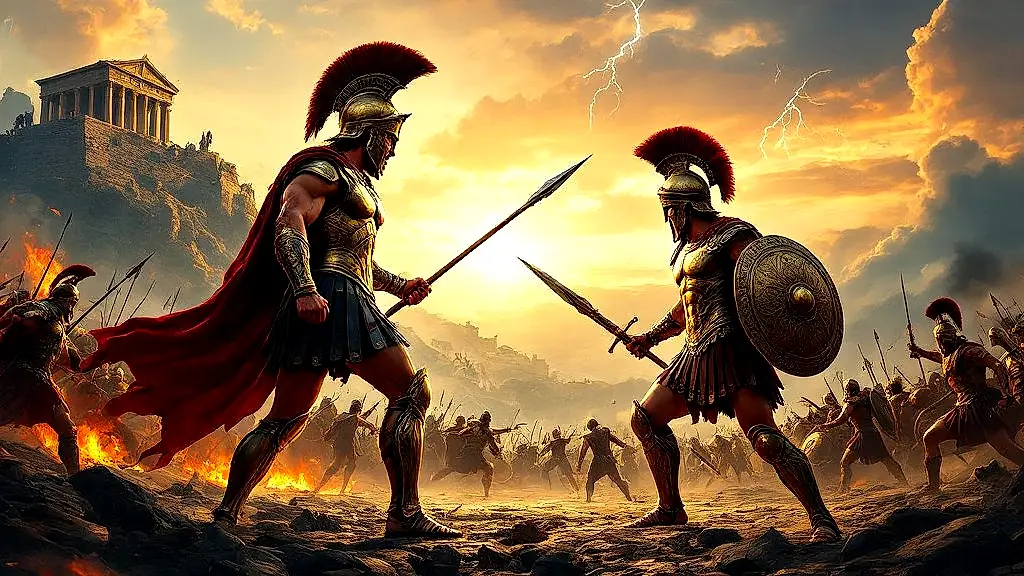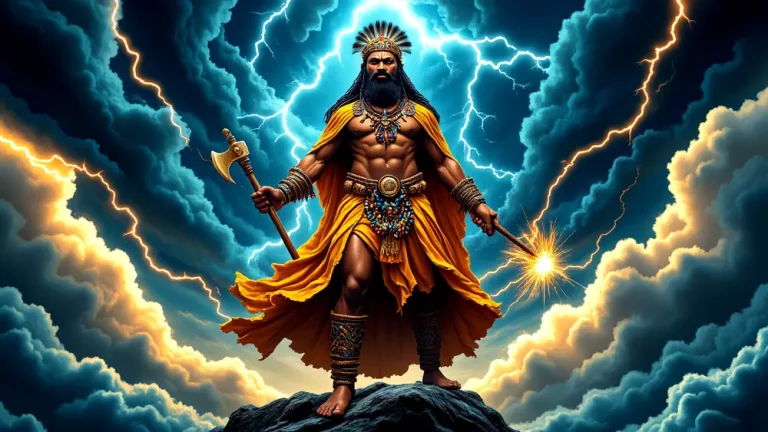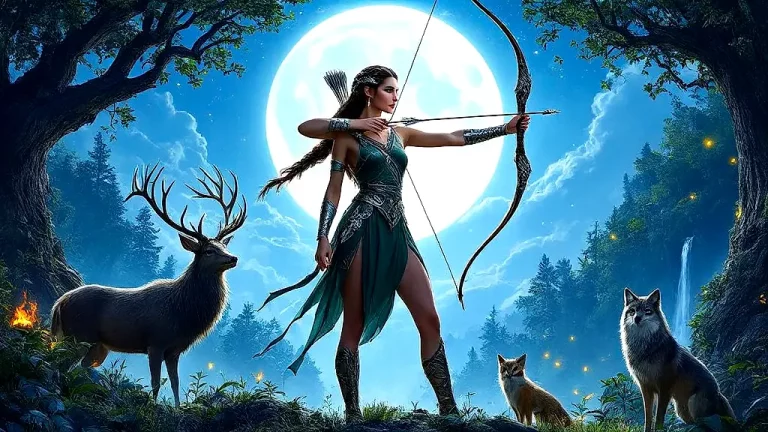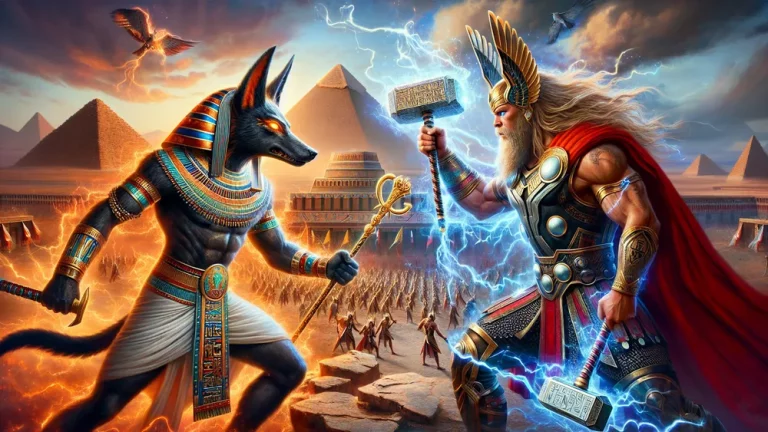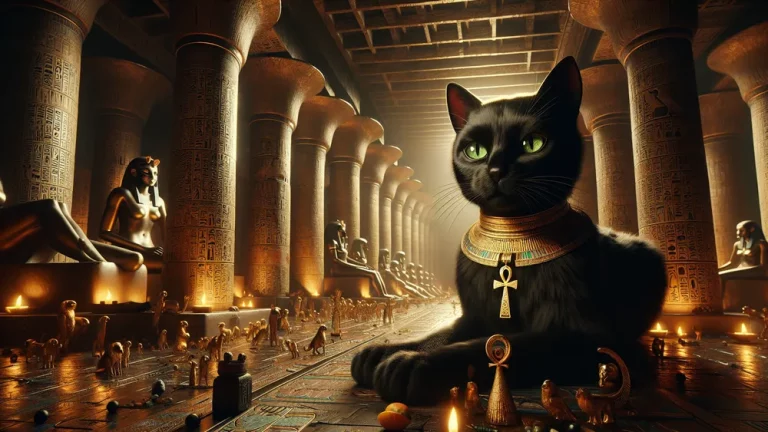Famous Battles In Greek Mythology And Their Epic Outcomes
The battles in Greek mythology weren’t just about strength. They were huge fights between gods, family feuds, and fights over who controlled the universe. Picture a world where gods throw mountains, giants tear islands from the ground, and a golden apple started a war that lasted ten years. These battles, like the Titanomachy (the war against the Titans) or the Trojan War, weren’t just stories.
Key Points:
- Zeus and the Olympians beat the Titans in a 10-year war, splitting control of the world into sky, sea, and underworld.
- The Giants, made by Gaia to get back at the Olympians, were nearly unbeatable unless a god and mortal teamed up—so Hercules joined the fight.
- A golden apple started the Trojan War when Paris picked Aphrodite’s offer of the most beautiful woman, leading to a 10-year battle between Greeks and Trojans.
- Achilles killed Hector in a duel after Hector killed Patroclus, then dragged his body, breaking tradition until Priam begged for it back.
- The Greeks tricked Troy with a wooden horse, hiding soldiers inside to win the war after years of fighting.
- Oedipus’s sons fought over Thebes, killing each other in a battle that ruined the city, proving no one escapes fate in Greek myths.
- Perseus used god-given tools like winged sandals and Medusa’s head to save Andromeda from a sea monster, showing smart thinking beats brute force.
They changed how the ancient Greeks saw the world, fate, and how unpredictable the gods could be. When Zeus beat Cronus, it wasn’t just about who ruled next. It also divided the universe into different parts – sky, sea, and underworld – and this split kept appearing in myths for hundreds of years. Some stories, like the Gigantomachy, even have different versions.
Did Hercules kill the giant Alcyoneus with arrows, or did he drag him away from his home? Sources don’t agree. Whether you’re new to mythology or reading these stories again, you’ll see alliances made because someone betrayed someone else, weapons given by gods, and fights where the stakes weren’t just life or death. They decided the fate of everything.
Battles In Greek Mythology: Overview and Key Facts
| Battle | Who Fought? | Why Did It Happen? | Key Events | Outcome |
|---|---|---|---|---|
| Titanomachy (Titan War) | Olympians (Zeus, Hera, Poseidon) vs. Titans (Cronus, Atlas) | Zeus led a rebellion because Cronus was afraid of losing power, just like he had done to his own father. Gaia had already predicted that Cronus would lose. | – Zeus freed the Cyclopes so they could make thunderbolts for him. <br> – Oceanus stayed out of the fight, which made the Titans weaker. <br> – Atlas got the worst punishment – he had to hold up the sky forever. | The Olympians won and split control of the world: Zeus took the sky, Poseidon the sea, and Hades the underworld. |
| Gigantomachy (Giants’ Revolt) | Olympians vs. Giants (Alcyoneus, Porphyrion) | Gaia created the Giants to get revenge for the Titans. Some stories say the Giants couldn’t die as long as they were on their home soil. | – Hercules had to help the gods win in some versions. <br> – Athena used Medusa’s head to turn enemies to stone. <br> – Zeus buried some Giants under volcanoes, like Mount Etna. | The Olympians’ power became even stronger, and people celebrated their victory with the Panathenaia festival. |
| Trojan War | Greeks (Achilles, Odysseus) vs. Trojans (Hector, Paris) | Eris used a golden apple to start a fight over who was the most beautiful. Paris picked Aphrodite, which made Hera and Athena furious. | – Achilles killed Hector after Patroclus died. <br> – Odysseus came up with the trick of the Trojan Horse. <br> – The gods picked who they wanted to win – Apollo helped Troy, while Athena sided with Greece. | After ten years, the Greeks destroyed Troy. Some, like Aeneas, escaped and left the city. |
| Seven Against Thebes | Polyneices’ army vs. Thebes (Eteocles) | Oedipus’s two sons fought for the throne because of the curse their father had placed on them. | – The brothers ended up killing each other in a duel. <br> – Only one of Thebes’ defenders survived the battle. | Thebes won, but the royal family was completely destroyed. |
The Titanomachy: War of the Titans
Want to know how Zeus and the Olympians took control? We’ll examine the Titanomachy – its beginnings, major clashes, and what happened after.
How the War Began
The Titanomachy goes all the way back to the first gods. Ouranos (Sky), the original ruler, was so afraid of his children – the Titans, Cyclopes, and Hecatoncheires – that he forced them back inside Gaia (Earth). Because of this cruelty, Gaia plotted with her youngest Titan son, Cronus. He ambushed his father with a sickle, castrating him and taking power.
Different versions say either Gaia pushed him to do it or Cronus acted alone, showing how stories changed over time. Cronus became just as bad as his father. After hearing a prophecy that his own child would overthrow him, he swallowed each newborn whole – Hestia, Demeter, Hera, Hades and Poseidon. This built up anger that would cause problems later, especially with his wife Rhea.
This was a messed up family situation where a father ate his kids to stay in power, while the mother secretly worked against him to save her youngest. The war really started when Rhea tricked Cronus. She hid their sixth child, Zeus, and gave Cronus a stone wrapped like a baby instead.
Zeus grew up hidden on Crete until he was strong enough to face his father. With Gaia’s help, he made Cronus throw up his brothers and sisters, which formed the Olympian group that would fight the Titans. These events set up a ten-year war that would change how the universe was ruled.
Cronus swallowed his children to keep power, but his wife Rhea tricked him by saving Zeus, who later freed his siblings and started the war against the Titans.
Big Fights and Clever Tricks
The Titanomachy showed how smart the gods could be, not just how strong they were. Zeus made his best move by freeing the Cyclopes from Tartarus. These giant craftsmen made three powerful weapons that made a difference:
- Zeus’s thunderbolts (extremely powerful weapons)
- Poseidon’s trident (could shake the earth)
- Hades’ helmet (made the wearer invisible)
Although most Titans kept fighting, Oceanus – the great river around the world – didn’t take sides. This wasn’t just refusing to fight; it meant the Titans couldn’t get help by sea or fresh soldiers. Some stories say Oceanus actually helped Zeus secretly, showing how myths often have hidden meanings.
The war’s most famous punishment was what happened to Atlas. After the Titans lost, Zeus didn’t just lock him up – he made him hold up the sky forever. This served several purposes:
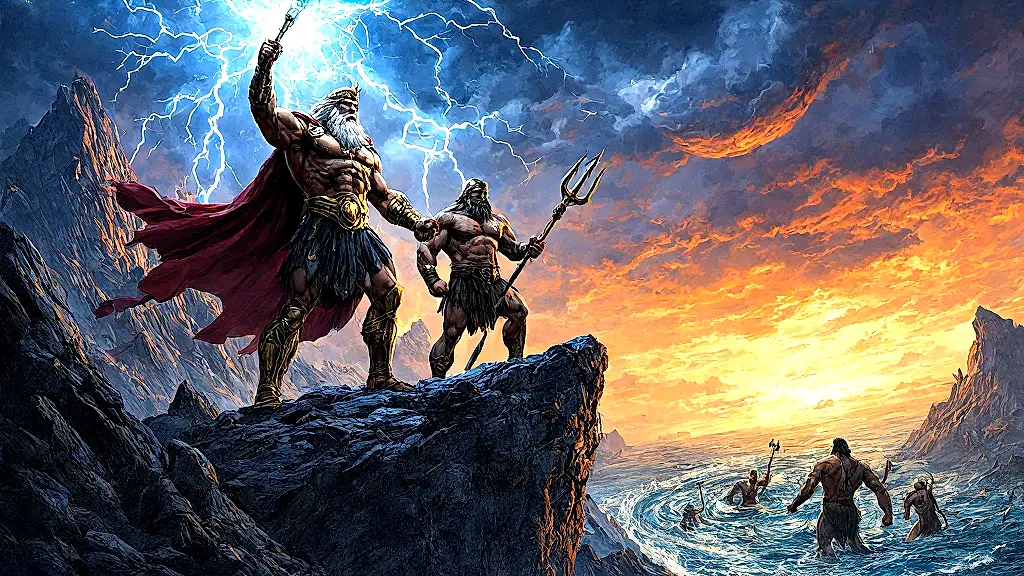
- Showed everyone the Olympians were in charge
- Took a strong enemy out of action without killing him
- Created something everyone would see (the sky being held up) Different stories argue whether Atlas holds the sky or the earth, but all agree it was both his punishment and a warning to others.
Zeus Wins and Reshapes the World
After ten years of fighting, the Olympians won and faced their first task: dividing the universe. The three brothers divided things up by drawing lots – Zeus got the sky and highest authority, Poseidon took the seas, and Hades received the underworld (some stories say he didn’t choose this underworld duty).
This division meant more than just territory – it created a new world order where Zeus’s thunderbolts were now the most powerful weapon, Poseidon could make the earth shake with his waves, and Hades’s realm became where all mortal souls eventually went. After imprisoning the Titans in Tartarus (guarded by the Hecatoncheires), Zeus set up his rule from Mount Olympus and assigned each Olympian specific areas to control.
The world now had a clear structure: Zeus as the leader, his brothers overseeing major realms, and other gods handling things like love (Aphrodite) or war (Ares). Some ancient texts like the Homeric Hymn to Pythian Apollo suggest not everyone accepted this new order right away, showing how even in myths, power changes often face resistance.
The Gigantomachy: Gods vs. Giants
Right when the Olympians believed they were firmly in control, Gaia sent her giant children to attack them. This started the Gigantomachy, which became another huge battle between gods and giants.
Gaia Strikes Back
Angry about the Titans losing, Gaia created a new race of Giants. These terrifying creatures formed when Uranus’s blood touched the ground. They weren’t just big – they had dragon-like legs and hair made of fire, specifically made to attack Olympus. Ancient sources don’t agree about how they looked. Some say they were human-shaped, while old paintings show them with snake-like legs.
But everyone agrees they had one scary advantage: they were almost impossible to defeat while standing on Gaia’s land near where the world began. The Giants had one weakness though – a special condition in the prophecy. They could only be beaten if both a god and a mortal worked together. This is why Hercules became so important later.
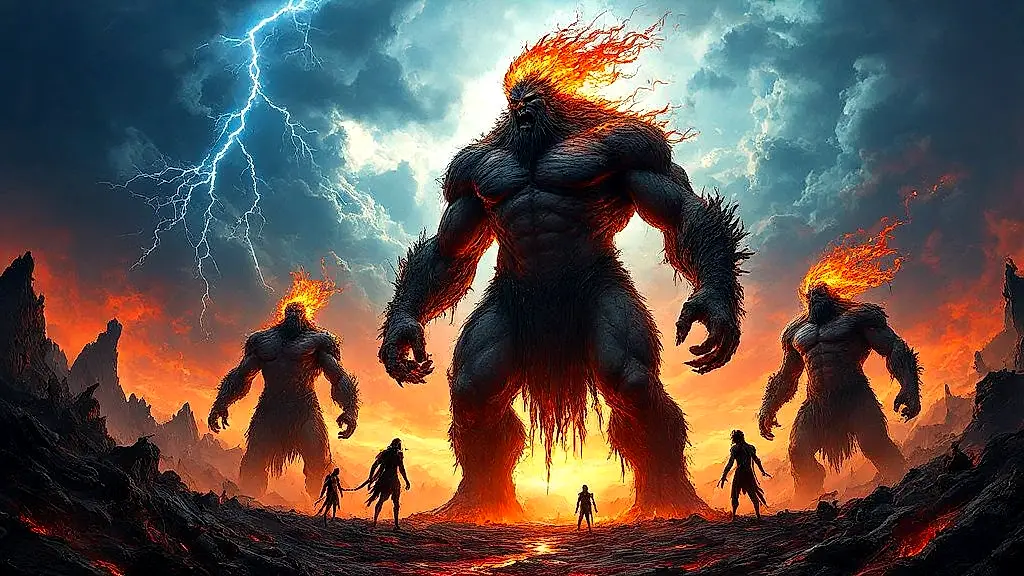
Gaia planned carefully, creating creatures with specific protections that forced the gods to get help from humans. Some stories say Gaia also made other monsters like Typhoeus as backup, which proved she kept trying to overthrow Zeus.
Hercules Joins the Fight
The Olympians had a secret weapon – Hercules. As a half-god, half-human, he fit exactly what the prophecy required. Fresh from finishing his Twelve Labors, he brought incredible strength plus smart tactics. He fought alongside the gods. His arrows had hydra venom, which made them especially effective against Giants. Against Alcyoneus, who kept coming back to life, Hercules finally won by dragging him away from his homeland.
Some stories say Athena helped aim his shots, which proved how the gods used his special abilities.
Hercules changed several important battles. He beat Porphyrion after Zeus weakened the Giant king first. Then he worked with Apollo to defeat Ephialtes in a famous archery contest. Here’s how each god fought:
| God | Weapon | Giant Target | Special Advantage |
|---|---|---|---|
| Zeus | Thunderbolt | Porphyrion | Powerful lightning |
| Athena | Aegis shield | Enceladus | Turning to stone |
| Poseidon | Trident | Polybotes | Throwing islands |
| Apollo | Silver arrows | Ephialtes | Perfect aim |
| Hercules | Poisoned arrows | Alcyoneus | Mortal advantage |
Working together this way did more than just add strength – it showed how the Olympians could adapt. While gods like Dionysus used magic staffs to confuse Giants, Hercules provided the mortal part the prophecy needed. His fighting with the gods also began a new era where exceptional humans could work directly with deities, something that became common in Greek myths.
Hercules, being half-god and half-human, was the key to defeating the Giants because his mortal side met the prophecy’s needs.
What Happened Next: Olympus Stands Strong
The Gigantomachy made Olympian rule permanent, which made their power absolute. After winning, the Athenians started the Panathenaia festival where people recreated the gods’ victory by giving Athena special woven robes. The Parthenon‘s stone carvings show this battle in detail. You can still find reminders of this important battle in Greek art and writing, which showed how order defeated disorder.
This win created a lasting pattern for how Greeks saw their gods’ complete control over nature.
The Trojan War: Mortals and Gods Collide
After securing their power as gods, the Olympians began interfering in human matters. This led to one of history’s most legendary wars – the well-known Trojan War where divine and human forces clashed.
The Fight Starts with a Golden Apple
The Trojan War began because of an argument at a wedding. Eris, the goddess of discord, threw a golden apple that had “To the Fairest” written on it, which immediately caused trouble. Three goddesses demanded it: Hera offered power, Athena promised victory in war, and Aphrodite said she would give him the most beautiful woman.
Ancient writers disagree about exactly what each goddess offered, but they all agree this started the chain of events that led to war. Paris, a Trojan prince who grew up as a shepherd, had to judge the goddesses. When he chose Aphrodite‘s offer instead of power or wisdom, he didn’t understand the consequences.
By picking Helen – who was already married to Menelaus – he activated a series of promises between gods and men. All Greek kings had sworn to protect Helen’s marriage after someone kidnapped her earlier. The results happened immediately and caused devastation. When Paris went to Sparta, Aphrodite kept her promise by making Helen go with him.
This gave Menelaus his reason for war, while Hera and Athena helped the Greeks. What began as a love story became a ten-year war, exactly what Zeus wanted to happen.
Achilles vs. Hector: The Ultimate Duel
When Achilles returned to fight after Hector killed Patroclus, he changed everything on the battlefield. He wore armor that Hephaestus made, which shone brightly as he searched for Troy’s best fighter. Even Hector‘s own soldiers ran away in fear, leaving him alone outside the city walls.
This fight wasn’t just about strength – it matched two very different warriors: Hector, who defended his home and family, against Achilles, who was overcome with anger and sorrow. The fight happened in stages. First Hector tried to talk, then ran when he saw Athena helping Achilles.
When they finally fought, Achilles used every advantage of his special armor, while Hector battled bravely. Athena tricked Hector into stopping, and Achilles stabbed him in the neck, the only place his armor didn’t protect. What happened next shocked everyone. Achilles dragged Hector‘s body behind his chariot for days, which was against tradition. But Homer shows us Achilles wasn’t completely heartless – when Priam begged for his son’s body, Achilles finally agreed.
This fight showed the true tragedy of the Trojan War, where even great heroes couldn’t escape what the gods had planned.
The Trojan Horse: A Sneaky Win
After ten years without victory, Odysseus created a plan so clever that armies still copy it today. The Greeks built a huge wooden Trojan Horse, which some say was an offering to Athena while others claim was just a trick. They hollowed it out and filled it with their best fighters, then pretended to sail away.
Only Sinon stayed behind to convince the Trojans the horse was safe.
The Trojans weren’t sure whether to trust this strange gift. Important people in the plan included:
- Odysseus: Who thought of the whole idea
- Sinon: The Greek who lied about abandoning the war
- Laocoön: The priest who warned about the horse before sea serpents killed him
During the night, while Troy celebrated their supposed victory, the hidden Greek soldiers came out. They opened the city gates for the returning army, making Troy vulnerable to attack. This proved that even the most clever tricks can win wars when people let their guard down.
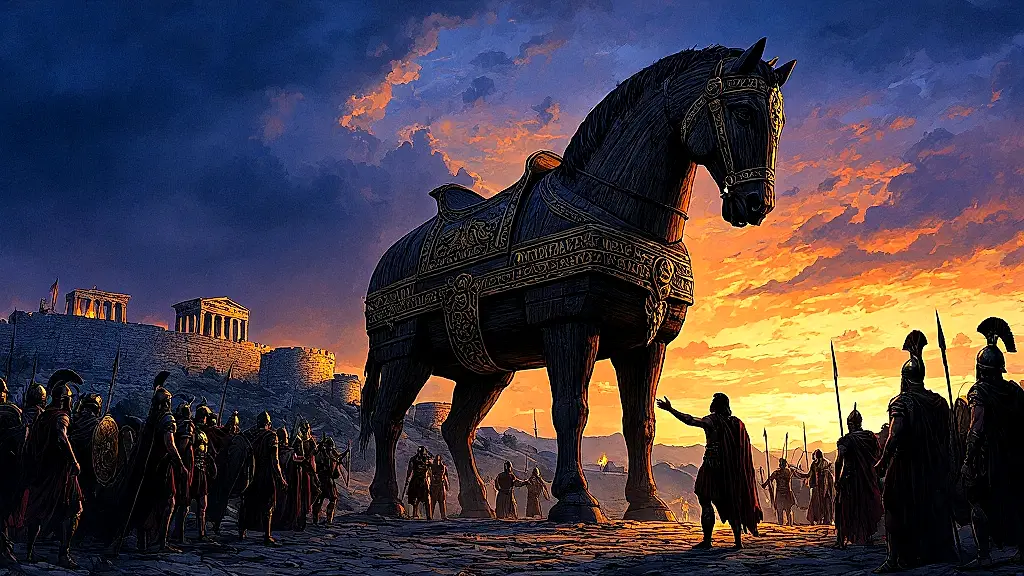
Lesser-Known Battles with Huge Impact
Most stories about Greek mythology focus mostly on the Trojan War and fights between gods. But many forget that other lesser-known battles changed what happened to heroes and cities in just as important ways.
The Seven Against Thebes
This story began years before when Oedipus didn’t know he fulfilled the prophecy about killing his father and marrying his mother. His sons Eteocles and Polynices agreed to take turns ruling Thebes, but Eteocles refused to give up power when his time ended. This began a civil war that was worse than most family arguments.
Polynices gathered six famous fighters to attack the city, which included Amphiaraus who knew he would die. Each warrior fought one of Thebes’ defenders at the city’s seven gates in a series of one-on-one fights. The worst moment came when the two brothers met at the final gate – so full of hate that they killed each other at the same time, the final result of their father’s curse.
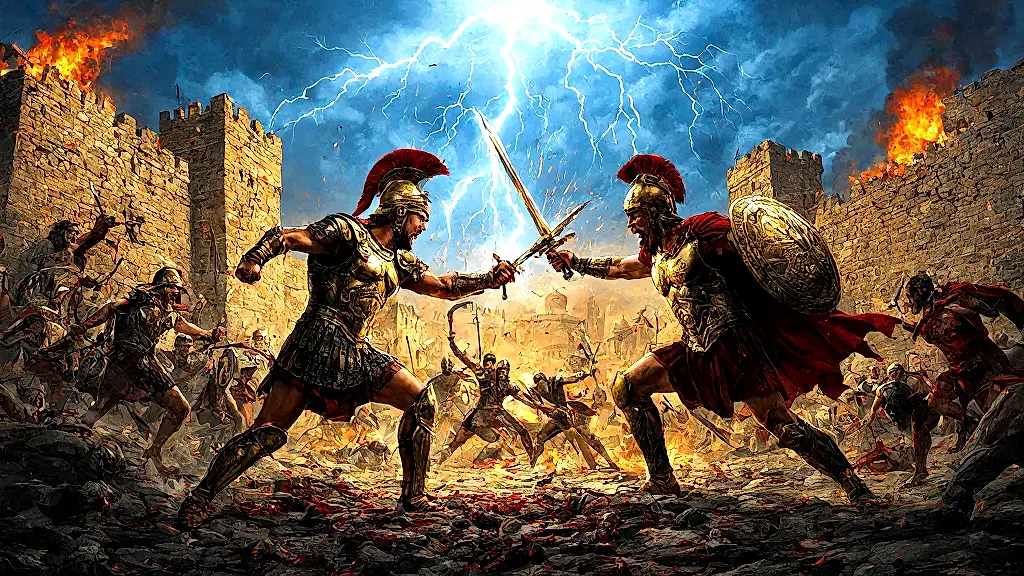
Different ancient writers tell parts of the story differently. Some say Zeus killed Capaneus with lightning, while others claim the earth swallowed Amphiaraus. What everyone agrees on is that Thebes won but was completely ruined. This shows how in Greek myths, no one could avoid their destiny, especially when the gods decided to destroy a family.
A family curse led two brothers to kill each other in battle after breaking their deal to share power, destroying Thebes despite its victory.
Perseus Saves the Day
Perseus was a great hero who fought monsters, and he had several god-given items to help him. One day he saw Andromeda, who people had chained to a rock as a sacrifice for the sea monster Cetus. He arrived at the right time with these special tools:
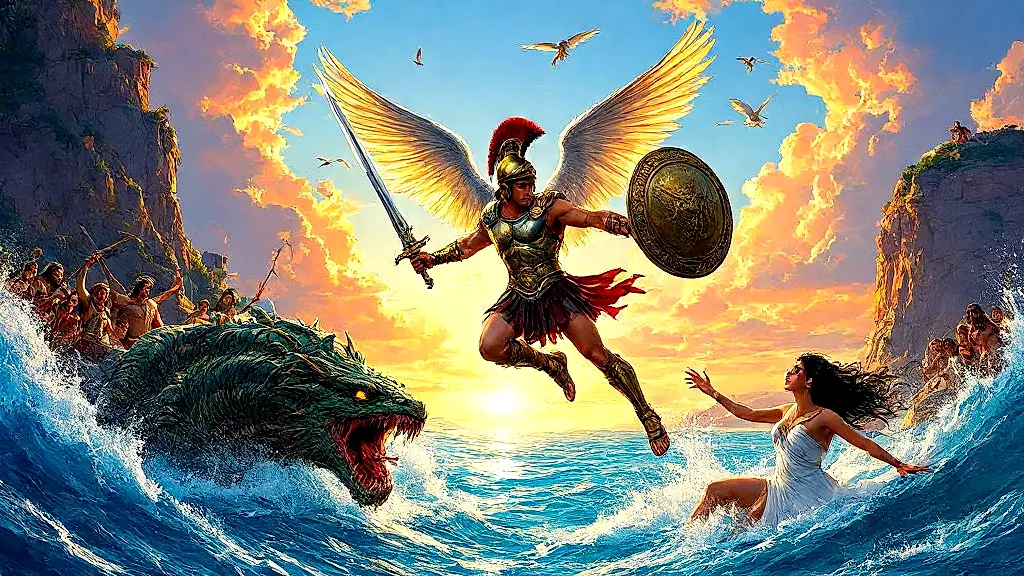
- Winged sandals from Hermes that let him fly
- Hades’ helm that made him invisible
- Athena’s shield that was polished like a mirror
- Medusa’s head that turned things to stone, kept in his magic pouch
Using these, Perseus fought Cetus, though stories differ about how exactly he won. Some say he flew above the monster, while others claim he used Medusa’s head. Either way, he saved Andromeda when no one else could. This showed that with help from gods and smart thinking, even the hardest challenges could be overcome.
Clash of Pantheons: Greek vs. Norse Battles
In Greek myths, the Titanomachy ended with Zeus making the Olympian gods rule forever. On the other hand, Norse mythology’s Ragnarök features destruction that repeats, where even Odin and Thor die before the world begins again. These stories show important differences between the cultures.
The Greeks valued order and things staying the same, while the Norse accepted that some things must happen, believing in a new world after the end. The table below explains the main ways their biggest wars differed.
FAQs
1. Which Greek god never lost a battle?
The Greek god who never lost a battle was Athena, the goddess of strategic warfare.
2. How did Greek gods influence mortal battles?
Greek gods influenced mortal battles by directly intervening (e.g., Poseidon flooding Troy) or granting divine weapons (e.g., Achilles’ armor).
3. Could Greek gods die in battles?
Greek gods could not die in battles, though they could be imprisoned or temporarily incapacitated.
4. Who was the strongest Greek warrior in mythology?
The strongest Greek warrior in mythology was either Achilles, famed for his near-invulnerability, or Hercules, renowned for his divine strength and Twelve Labors.

